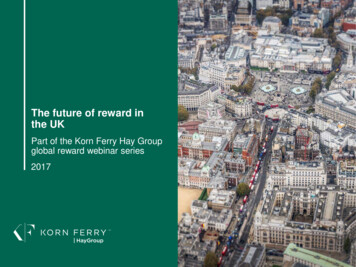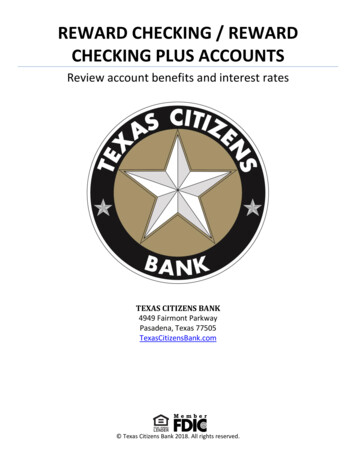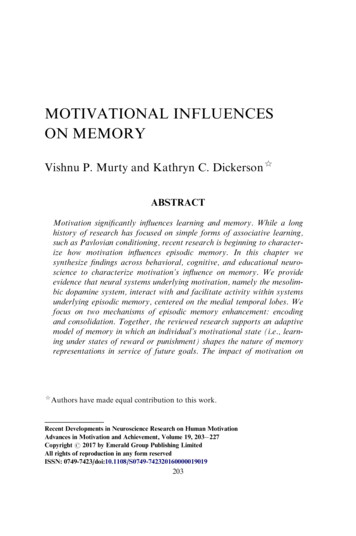
Transcription
The future of reward inthe UKPart of the Korn Ferry Hay Groupglobal reward webinar series2017
Meet your presentersMark ThompsonSenior Partner and Head of Reward and Benefits Solutions forthe UK and IrelandKorn Ferry Hay GroupBased in London, UKPhone: 44 (0)20 3819 7223Email: mark.thompson@kornferry.comMark RobinsonSenior Account Manager, RewardKorn Ferry Hay GroupBased in Manchester, UKPhone: 44 (0)161 831 2492Email: mark.robinson@kornferry.com 2017 Korn Ferry. All rights reserved2
Agenda1ABOUT KORN FERRY HAY GROUP42REWARD IN CONTEXT73GLOBAL PAY OUTLOOK144EUROPEAN DATA HEADLINES215UK DATA IN DETAIL246UK KEY BUSINESS ISSUES31 2017 Korn Ferry. All rights reserved3
1About Korn FerryHay GroupWho we are and what we do
Korn Ferry is the preeminent globalpeople and organizational advisory firm.We help leaders, organizations andsocieties succeed by releasing the fullpower and potential of people.Our nearly 7,000 colleagues deliverservices through our ExecutiveSearch, Korn Ferry Hay Group andFuturestep divisions. 2017 Korn Ferry. All rights reserved5
Korn Ferry – a total approach to talentKorn Ferry Executive Searchhelps you attract the bestexecutive talent for moving yourcompany in the right direction.Korn Ferry Hay Group helps youalign your organization to yourpeople – developing, engaging,and rewarding them to reachnew heights.OrganizationKorn Ferry Futurestep deliversprofessional talent that buildsup leadership.PeopleStrategy execution andorganizational designAssessment and successionTalent strategy and work designExecutive search and recruitmentRewards and benefitsLeadership development 2017 Korn Ferry. All rights reserved6
2Reward in context
2030 Megatrends (from Hay Group Leadership 2030)Individualizationand value pluralismTheenvironmentalcrisisThe digital eraChangingworkingpatternsGlobalization 2.0DemographicchangeTechnologicalconvergence 2017 Korn Ferry. All rights reserved8
What CEOs are concerned about – ‘hot button’ issuesHot button issues (2017)Developing ‘Next Gen’ leadersGlobal Political UncertaintyFinancial Instability in EuropeCyber SecurityGlobal 435410341571Source: Conference Board CEO Challenge Survey, 2017 2017 Korn Ferry. All rights reserved9
What CEOs are concerned about – human capital strategiesHuman capital strategies (2017)USAsiaEuropeLatamGlobalEncourage an open, safe andtransparent ‘speak up’ culture21121Provide employee trainingand development43283Communicate effectively, consistentlyand transparently55334Improve performance managementprocesses and accountability12412Enhance effectiveness of seniormanagement team345105Source: Conference Board CEO Challenge Survey, 2017 2017 Korn Ferry. All rights reserved10
UK context – headlines The last few years and up to 23rd June 2016:Economic growth strongerthan most WesternEuropean countriesEmployment at recordlevels but many newjobs are low paid andpart-timeTherefore, despiteeconomic growth, there e(real) wage growth hasbeen modestUltra low inflation and lowinterest rates has been afeature of the UKeconomy since 2009 Then on 23rd June 2016, the UK voted to leave the European Union (Brexit):Immediate currency devaluation by 12%-17%This and other factors will drive price inflation higher in 2017 Nothing is certain except uncertainty. There is a wide range of possible Brexit outcomes, including: ‘Hard’ Brexit ‘Soft’ Brexit No Brexit at allLeaving the single market andcustoms union. This scenario isincreasingly likely but its impactwill depend on the deals done toreplace the common marketLeaving the EU but remaining inthe single market and/or customsunion. Economic impact will beless than that of a hard Brexit –but this is harder to achieve (bothdiplomatically and politically)Very unlikely, but possible thatcomplexity of Brexit and legalchallenges will mean the UKremains a member of the EU 2017 Korn Ferry. All rights reserved11
UK context – talent managementComplexityDetailsAgeing workforce Increasing longevity means we will have to accommodate more older peopleinto the workforceContinuing skillsshortages Fewer choose to study in STEM fieldsLimited diversity inleadership roles Many sectors face challenges in attracting women and minoritiesGlobalization ofthe workforce Increasing need for talent to be able to lead diverse teams with the culturaldexterity to thrive in new environmentsAccelerating pace ofautomationPay market pressuresProductivity Obsolescence of many traditional jobs Rebalancing of the skills portfolios and working practices required to deliverorganization goals The UK labour market remains close to full employment Years of pay restraint leading to increasing pressure Sluggish productivity growth since the Financial Crisis leading to inability toincrease pay without putting up prices 2017 Korn Ferry. All rights reserved12
UK recruitment challenges In 2016, 47% of companies reported experiencing a scarcity of candidates.Percentage of companies reporting candidate scarcity by job familyEngineering49%Information Technology20%Sales18%Marketing10%Research and Development9%Project Management7%Production7%Finance and Accounting7%Logistics/Supply Chain4%Customer Service4%Health/Safety/Environment2%Call Center2%Quality Assurance1%Legal1%Human Resources1%Category Management1%Administration/Support1%Highest turnover ratesin sales, engineering,admin/supportand finance12.4%AveragevoluntaryturnoverPercentage of companies reportingcandidate scarcity47%41%47%201420152016Source: Hay Group compensation report July 2016 2017 Korn Ferry. All rights reserved13
3Global pay outlookSalary trends andpredictions for 2017
Our pay data – key figures Countries where we collectand provide pay data:110 Organizations in our paydatabase worldwide: Job holders for whom wehave 2016 salary data:25,00020m 70%Of the Fortune 500use our pay data,and contribute toour database.7015 Every 70 seconds,a user logs into PayNet.Years of sustainedglobal database growth.2500 FMCG sectorcompanies in ourglobal database. 2017 Korn Ferry. All rights reserved15
Where do we have data?North America2 Countries2,600 Companies5.5m PeopleLatin America18 Countries2,500 Companies3.1m PeopleEurope43 Countries12,300 Companies8.1m PeopleAfrica24 Countries1,200 Companies607,000 PeopleMiddle East10 Countries2,200 Companies1.1m PeopleAsia13 Countries3,800 Companies2.4m PeoplePacific4 Countries911 Companies447,000 People 2017 Korn Ferry. All rights reserved16
Global outlook: salary trends and predictions for 2017 There is consensus that:Growth in 2017 willbe slightly lower thanin the last coupleof years Inflation in 2017 willbe slightly higher thanin the last coupleof years There presents a hard choice for companies:Keep employee pay rising in real terms This is likely to cause a squeeze on realpay increases:Lower growth means thataffordability will be harderfor companiesHigher inflation means thatmore of any ‘headline’ payincreases will beeaten up by inflation Inflation means this will cost more, sowhere will the money come from? Priceincreases? Lower profits? Betterproductivity?Allow real wage increases to be squeezed This has obvious effects on employeeengagement and motivation. And (unlikein the last recession) the job marketprovides alternative options. 2017 Korn Ferry. All rights reserved17
Global outlook – salary trends and predictions for 2017Headlines: ‘Headline’ salary forecasts slightly (0.1%) down on last year (4.5% 4.4%). ‘Real’ (i.e. inflation adjusted) forecasts down 0.4% on last year (2.7% 2.3%). Highest real increases forecasted in Asia, but China’s forecast is significantly down (6.3% 4.0%). Mature markets see headline increases averaging 2 to 3%, real increases averaging 1 to 2%.Source: Hay Group Global Salary Forecast 2017 2017 Korn Ferry. All rights reserved18
Global outlook – salary trends and predictions for 2017Forecasted salary increase 2017IndiaReal wage increase 2017(salary forecast – inflation)10.0%Brazil8.8%South 0.4%South Africa0.5%Russia 1.9%0.5%1.9%0.9%2.2%-0.3%1.5%Source: Hay Group Global Salary Forecast 2017 (selected countries) 2017 Korn Ferry. All rights reserved19
How sectors are currently performing globally These percentages show, overall and regardless of country or level, how much the industry is paying itsemployees in 2016 compared to other industries.ChemicalsConstructionFinancialsFMCGHigh Tech9.0%-4.0%2.5%2.4%2.3%Life SciencesNaturalResourcesOil & 6%8.4%3.8%IndustrialGoods-1.5%% – Globally, overall, how much the industry pays compared to the general market 2017 Korn Ferry. All rights reserved20
4European dataheadlines
European salary forecast 2017Ukraine11.3%Turkey4.1%Russian 7.0%Romania4.0%8.6%2.8%4%East Europe regional France3.0%Bulgaria2.0%GermanyKazakhstanCzech aUnited Kingdom2.8%Austria6%8%10%12%5.1%Source: Korn Ferry Hay Group Global Salary Forecast 2017 (selected countries)2.0%0%2%4%West Europe regional average:6%8%10%12%2.2%Source: Korn Ferry Hay Group Global Salary Forecast 2017 (selected countries) 2017 Korn Ferry. All rights reserved22
European salary comparisons 2017 Korn Ferry. All rights reserved23
5UK data in detail
UK general industry overview The UK general industry outlook is GDP growth rate estimated at around 1% Unemployment rate is estimated to rise slightly to 5.3% Inflation forecast to increase to 2.8% in 2017 UK pound has fallen against dollar from highs of around 1.5 to 1.25Data effective date:01 January tEconomic .2%Unemployment(3)4.9%5.3%5.5%5.4%Wage inflation(4)1.8%-1.0%-0.5%-0.5%Key1. GDP (% real change per annum): Percentage change in real GDP, over previous year2. Consumer prices (% change per annum; period average): Percentage change in consumer price index in local currency (period average), overprevious year3. Recorded unemployment (%): Recorded official unemployment as a percentage of total labor force4. Average real wages (% change per annum): Percentage change in hourly wages in local currency adjusted for inflation, over previous year 2017 Korn Ferry. All rights reserved25
UK salary data in detailOverall salary forecast for UK in 201732.52.52.52.3 The forecast revealsthat, adjusted forinflation, workers inthe UK are expectedsee real salarydecreases of:0.3%210.80201520162017-0.3 down significantlyfrom last year’sprediction of:2.3%-1ForecastReal 2017 Korn Ferry. All rights reserved26
Salary movements Vs inflation Post recession, employees have gradually seen ‘real’ salary increasesgrow. In 2017, ‘real’ salaries are due to decrease by about 0.3% due to risinginflation.6.00%Senior manager6.00%Senior managerProfessional5.00%Head of functionProfessional5.00%Head of functionOperative / clerkOperative / 00%0.00%RPI2005 2006 2007 2008 2009 2010 2011 2012 2013 2014 2015 20162005 2006 2007 2008 2009 2010 2011 2012 2013 2014 2015 2016-1.00% 2017 Korn Ferry. All rights reserved27
UK sector comparisons The graph shows,irrespective of job size, thecomparison of each sectorssalary against the UKmarket. These are average figures,which mask the fact thatsome sectors fluctuate incompetitiveness acrossdifferent employee levels. 2017 Korn Ferry. All rights reserved28
3%–89%Call ply ent104%LegalHealth andEnvironment103%Research niorManagementBase SalaryComparisonFinance port/ServiceUK job family comparisonsThe table shows, by job level the comparison of each job families median pay to the overall UKmarket. 2017 Korn Ferry. All rights reserved29
UK regional comparisons London continues tohave the highest salariesin the UK but also hasthe highest cost of living. Aberdeen has a heavypresence of oil industryorganizations, which hasdriven salaries up. 2017 Korn Ferry. All rights reserved30
6UK keybusiness issues
Key business issues: talent management Brexit: What will be the impact on talentsupply and demand? Productivity Lack of progress on productivity isa particularly acute problem forthe UK. Automation What will be the impact on jobsand skills? Team-based/agile working What does this mean for how wepay people? Performance management Widely recognized that traditionalapproaches are not working. 2017 Korn Ferry. All rights reserved32
Key business issues: regulations Gender pay gap Government expected to pass laws mandating ‘gender pay gap’ reporting from 2017: Companies will need to publish mean and median salary and bonus, for men and women – as wellas data on female representation at senior job levels. The data being published will not look good – and will need lots of communication around it – bothexternally (to protect reputation as a good employer); and internally. Executive pay Generally, more attention on CEO and senior manager pay. This could be next in terms ofnew laws with a requirement to publish pay ratios most likely and a pay cap on public sectorexecutives a possibility. Minimum wage The UK minimum wage is rising quickly – currently 7,20 it will rise to 7.50 in April and to a 9 hour‘living wage’ by 2020. This is causing two issues for companies. Cost optimization – companies are looking at workforce planning, to assess the people they need. Knock-on effects – When the most junior jobs are paid more, those immediately above them will alsoneed to be paid more (to maintain internal pay relativity). A consequence is less pay progression whenmoving up levels. ‘Gig Economy’ Recent case law indicates employment protection legislation will include associates working fororganizations like Uber, Deliveroo and City Sprint. 2017 Korn Ferry. All rights reserved33
Key business issues: Engagement The UK has one of the lowest rates of ‘effective’ people in EuropeEnabled Over half of our employees are not performing to their potential, nearly a quarter are ineffective*Detached48%12%Ineffective Raising the levels of engagement andenablement across the UK workforcemust be one of the answers to the‘productivity puzzle.’Effective This requires investment in thetechnologies and infrastructure thatenables people to do their jobs.Frustrated27% The link between reward andengagement is complex but thismust be a primary measure ofreward effectiveness in the future.12%EngagedSource: Korn Ferry Hay Group Insight employee surveys 2017 Korn Ferry. All rights reserved34
Keeping talent – predictors of employee retentionEmployeesplanning to stayfor two yearsEmployeesplanning to leavewithin two yearsGapConfidence in ability to achieve career objectives64%31%33%Trust and confidence in company senior management60%35%25%Opportunities for learning and development71%45%25%Benefit that meet employee needs68%45%23%Company demonstrates care and concern for employees62%39%23%Company is effectively managed and run well73%51%23%Adequately authority to do job73%51%23%Employees paid fairly for the work they do53%31%22%Supervisory coaching for development67%45%22%Support for employee creativity and innovation70%48%22%Cross-work unit collaboration and support63%41%22%Direction and goals are the right ones for the company73%51%22%Source: Hay Group Employee Opinion Norms (2017) 2017 Korn Ferry. All rights reserved35
Key business issues: career developmentThere is an acceleratingtrend towards:Most reward structures are notaligned to these approaches towork and career design More agile working, Team-based organisation formsThey are job-based and work on the premisethat the job is fixed and relatively timeless The development of career/experiencepathways that typically involve cross lateralas well as hierarchical career progression They are hierarchical – there’s little incentive todevelop a portfolio of skills when the quickest wayto increase pay is a promotion to the boss’s job 2017 Korn Ferry. All rights reserved36
Korn Ferry Hay Group’s reward framework2. To achieve this, weconsider talent needs ofthe company in thecontext of its strategy5. Finally, weensure at theoutset that thereare clearlydefined andmeasurableoutcomes thatcan beassessedfollowingimplementation1. To maximizethe return onreward spend,it is critical tolink rewards tothe things thatmatter most tothe business3. In addition, rewardpolicies are designed toappeal to the people wewant to attract, engageand retain4. Once we are clear about thestrategic context together withbusiness and employee needs,we design the reward packagealigned to those needs 2017 Korn Ferry. All rights reserved37
A reward manager’s to-do list UK 2017 until further notice2. Plan and review thetalent needs of thefuture and potentialpinch-points1. Investigate andunderstand thepotential impactof Brexit,automation,technicalchange andbusinessdirection on yourorganization3. Ensure you understand the attitudesand expectations of the people youwant to keep. Are you giving‘Generation Rent’ what they need?5. Develop ascorecard tomeasure rewardeffectiveness4. Audit your reward policies andtotal reward proposition to identifywhere there is a misalignment withbusiness strategy in general andHR and talent strategy inparticular 2017 Korn Ferry. All rights reserved38
Assessing reward effectiveness and ROI – a templateQuantitative ( )External benchmarkingROI benchmarking Compensation and benefits surveys ROI/productivity analysis Total remuneration surveys Total employment cost benchmarkingCompensation levels vs.financial/operational ratios Reward design prevalence surveys Turnover rates key talent retention Bench strength – quality and quantity Cost of replacing workersPerceptualExternal perception benchmarkingInternal perception benchmarking Comparison of employee opinion surveyw/other organizations Employee opinion survey (longitudinal),focus groups Employer brand/reputation. benchmarking(e.g., best places to work, most admiredcompanies) Perceptions of reward effectiveness,fairness, competitiveness, preferences Perceptions of alignment with businessstrategy, performanceExternalInternal 2017 Korn Ferry. All rights reserved39
On last thing In the UK economy, human capitalis worth 4.23 times more thanphysical capital. Human capital is also the greatestvalue creator available toorganizations: For every 1invested in human capital, 11.39is added to GDP.* Managing reward and motivation istherefore as critical as ever, even inthe digital age!*Figures from The Trillion Dollar Difference, Korn Ferry Institute 2016 2017 Korn Ferry. All rights reserved40
Mark ThompsonMark RobinsonSenior Partner and Head of Reward and BenefitsSolutions for the UK and IrelandSenior Account Manager, RewardKorn Ferry Hay GroupKorn Ferry Hay GroupPhone: 44 (0)161 831 2492Phone: 44 (0)20 3819 binson@kornferry.com
Thank you for joining ourwebinar todaySign up for other reward webinars in theseries here: http://bit.ly/RewardWebinarHub
3 GLOBAL PAY OUTLOOK 14 4 EUROPEAN DATA HEADLINES 21 5 UK DATA IN DETAIL 24 6 UK KEY BUSINESS ISSUES 31. 1 About Korn Ferry . Percentage of companies reporting candidate scarcity by job family Source: Hay Group compensation report July 2016 47% 2016 41% 2015 47% 2014 Highest turnover rates in sales, engineering, admin/support and finance











